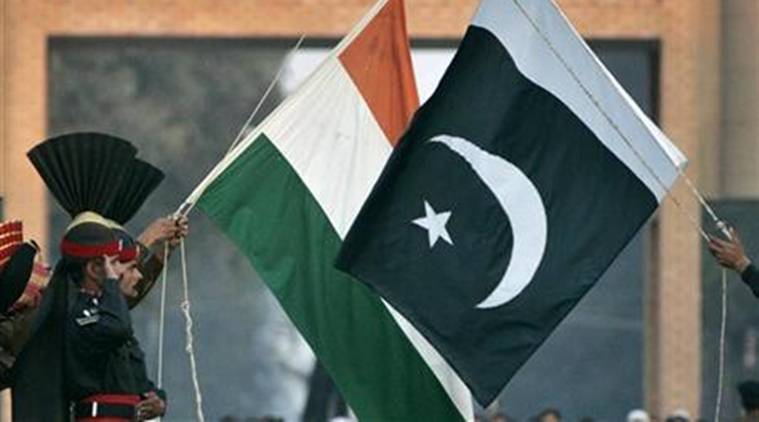Stay updated with the latest - Click here to follow us on Instagram
Increased expenditure on defence detrimental to fight against poverty, say India and Pak legislators
BJP MP Kirti Azad chaired the ninth round of Pakistan-India Legislators and Public Officials Dialogue along with Syed Naveed Qamar, a current Member of National Assembly from Sindh.
 BJP MP Kirti Azad chaired the ninth round of Pakistan-India Legislators and Public Officials Dialogue along with Syed Naveed Qamar, a current Member of National Assembly from Sindh. (file photo of Beating Retreat at Wagah border)
BJP MP Kirti Azad chaired the ninth round of Pakistan-India Legislators and Public Officials Dialogue along with Syed Naveed Qamar, a current Member of National Assembly from Sindh. (file photo of Beating Retreat at Wagah border)
Continuing their dialogue over major issues concerning both the countries, legislators from India and Pakistan, met here for the third time in last two months and agreed that the continued rise in expenditure on arms by both countries will be detrimental to the welfare of the people of the two nations.
The ninth round of Pakistan-India Legislators and Public Officials Dialogue was facilitated by Pakistan Institute of Legislative Development and Transparency (PILDAT), Islamabad. The dialogue focused on the theme of sharing of lessons on developments in poverty alleviation in India and Pakistan. Due to the strained relations between the two countries and the inability to secure visa for participants to hold the conference in the sub-continent, the dialogue has been held in Dubai.
While the dialogue saw overall consensus on both global and South Asian success with some reduction in poverty numbers, despite complexity of measuring poverty and disagreements on successful strategies, participants believed that a major chunk of funds was being spent to meet defence needs.
The Bharatiya Janata Party (BJP) MP from Darbhanga, Bihar, Kirti Azad chaired the dialogue along with Syed Naveed Qamar, former finance minister of Pakistan and a current Member of National Assembly from Sindh. Among others from India who attended the conference and actively participated in it were Adarsh Shashtri and Ajay Dutt, Aam Aadmi Party (AAP) MLAs from Delhi, Mahenderjit Singh Malviya, Congress MLA from Rajasthan, Reetika Khera, Associate Professor Economics, Indian Institute of Technology Delhi, Sanjeev Ahluwalia, Advisor, Observer Research Foundation, New Delhi, Vijay Sardana specialist in bio-economy and agribusiness value chains and Yamini Aiyar, Senior Research Fellow and Director, Accountability Initiative, New Delhi.
The Pakistani delegates included Dr Arif Alvi, Member of National Assembly from Karachi, Members of Provincial Assembly of Punjab Azma Bukhari, Malik Muhammad Ahmad Khan, Dr Murad Rass, Mahtab Akbar Rashdi from Sindh, Dr Nadeem ul Haque, Former Deputy Chairman, Planning Commission of Pakistan Ahmed Bilal Mehboob, President, PILDAT and Aasiya Riaz, Joint Director, PILDAT.
The participants highlighted that acceleration in economic growth on a sustained basis is an important policy objective for poverty reduction. For this policy and reform, the two countries must introduce reforms in institutions of governance. Participants from India highlighted a number of social safety net programmes, including the Public Distribution System, that have helped alleviate poverty in India adding that success also needs to be based on equitable and sustained growth and the inclusion of stakeholders other than Government.
While Pakistani participants showcased economic growth and role of remittances from workers abroad, they also cited some success emanating from targeted-subsidy programmes in reducing poverty. It was said that such programmes help immediate needs but for longer-term impact, job creation and equal opportunities are also critical. Participants also underscored that in order to gain greater benefits of remittances, focus must also be placed on improvements in education and vocational training.
The dialogue also recognised with concern the growing gap in rich and poor segments of society both in Pakistan and India. Comprehensive poverty alleviation strategies must also focus on reducing inequality within society in both countries, the statement issued at the end of the dialogue said. Participants highlighted exclusion of the poor in planning as well as in prioritising development schemes. There needs to be an increased focus on expenditures by governments in housing, public health, public education and in other social sectors, the statement added.
Highlighting food security as a critical looming challenge for Pakistan and India, dialogue participants emphasised that both countries must focus on revamping agricultural growth policies that are farmer-friendly and incentivise them as key stakeholders.
Participants underscored that dialogue provides the best forum to share such good practices. While commending PILDAT’s efforts in conceptualising, designing and facilitating dialogue and interaction between Pakistan and India, dialogue participants advised PILDAT to continue the dialogue on relevant themes in the future as well.







